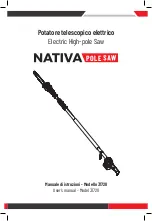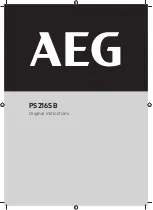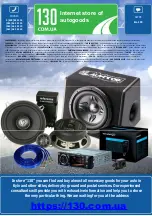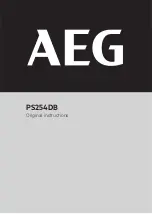
www.scheppach.com /
+(49)-08223-4002-99 /
+(49)-08223-4002-58
30 | GB
11.
Before use, ensure that all of the tools used by you
full the technical requirements of this power tool
and are properly attached.
12.
The saw blade supplied should only be used for
sawing wood and never for working metal.
13. Use the saw blade intended for the material to be
processed.
14.
Use only a saw blade with a diameter that match
-
es the specifications on the saw.
15.
Use only saw blades that are marked with an
equal or higher rotational speed than that marked
on the power tool.
16.
Use only saw blades recommended by the manu
-
facturer which conform to EN 847-1, if intended for
cutting wood or similar materials.
17. Wear suitable personal protective equipment,
such as:
– hearing protection;
– protective gloves when handling saw blades.
18.
Use only saw blades recommended by the manu
-
facturer which conform to EN 847-1. Warning! When
changing the saw blade, make sure that the cutting
width is not smaller and the thickness of the saw
blade is not greater than the thickness of the splitter.
19. When sawing wood and plastics, avoid overheat-
ing the saw teeth. Reduce the feed speed to avoid
the plastic melting.
Residual Risks
This power tool has been constructed in accord
-
ance with the latest technology and the generally
recognised safety regulations. Nevertheless, it is
possible that individual residual risks may occur
during operation.
• Electrical hazard if improper electrical connection
cables are used.
•
In addition, concealed residual risks may be present
in spite of all the precautions that have been taken.
•
Residual risks can be minimised by observing the
„Safety instructions“ and „Use in accordance with
the designated purpose“, as well as the operating
instructions.
•
Do not put any unnecessary stresses on the ma
-
chine: excessive pressure during sawing will quickly
damage the saw blade. This may result in a reduc
-
tion in the performance of the machine, as well as a
reduction in the cutting accuracy.
•
Avoid switching the machine on by accident: when
inserting the plug into the socket, the power button
must not be pressed.
• Use the tool which is recommended in this manual.
This will ensure the optimal performance of your saw.
•
Keep your hands away from the working area when
the machine is in operation.
•
Before you carry out any adjustments or servicing
work, turn the device off and remove the mains plug.
e) Secure the circular table saw.
If a circular table saw is not secured correctly, it
can move or topple.
f)
Remove the adjustment tools, wood residues,
etc. from the circular table saw before switch-
ing it on.
Deflections and possible jams could be dangerous.
g) Always use the right size of saw blade
and an appropriate location hole (e.g. dia
-
mond-shaped or round).
Saw blades that do not fit with the mounting parts
of the saw will run out-of-centre and result in a loss
of control.
h) Never use damaged or incorrect saw blade
mounting materials, such as flanges, washers,
screws or nuts.
These saw blade mounting materials have been
specially designed for your saw, for optimum per
-
formance and operational safety.
i) Never stand on the circular table saw and do
not use it as a step stool.
Serious injuries can arise if the electric tool topples
or if you accidentally come into contact with the
saw blade.
j)
Make sure that the saw blade is mounted in the
correct direction of rotation. Do not use grinding
discs or wire brushes with the circular table saw.
Incorrect assembly of the saw blade or the use
of accessories that have not been recommended
can result in serious injuries.
Safety instructions for handling saw blades
1.
Only use tools which you know how to handle.
2.
Pay attention to the maximum speed. The max
-
imum speed stated on the tool being used must
not be exceeded. Keep within the speed range if
one is specified
3. Note the direction of rotation of the motor and saw
blade.
4.
Do not use any insertion tools with cracks. Sort out
cracked insertion tools. Repairs are not permitted.
5.
Clean grease, oil and water off of the clamping
surfaces.
6.
Do not use any loose reducing rings or bushes to
reduce holes on circular saw blades.
7.
Make sure that fixed reducer rings for securing the
insertion tool have the same diameter and have at
least 1/3 of the cutting diameter.
8.
Make sure that fixed reducer rings are parallel to
each other.
9. Handle the tools used with care. It is best to store
these in their original packaging or special con-
tainers. Always wear protective gloves to improve
your grip and further reduce the risk of injury.
10.
Before using any of the tools, ensure that all pro
-
tective devices are correctly attached.
















































